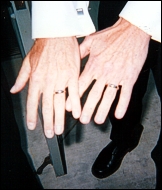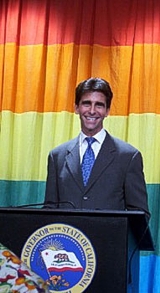|
Topic: Gay Marriage: Why it Matters
 As
of September 2005 in the United States,
only the state of Massachusetts recognizes
same-sex marriage, while California,
Connecticut, the District of Columbia,
Hawaii, Maine, New Jersey and Vermont
grant persons in same-sex unions a similar
legal status to those in a civil marriage
by domestic partnership, civil union or
reciprocal beneficiary laws. As
of September 2005 in the United States,
only the state of Massachusetts recognizes
same-sex marriage, while California,
Connecticut, the District of Columbia,
Hawaii, Maine, New Jersey and Vermont
grant persons in same-sex unions a similar
legal status to those in a civil marriage
by domestic partnership, civil union or
reciprocal beneficiary laws.
Sixteen states have constitutional
amendments explicitly barring the
recognition of same-sex marriage,
confining civil marriage to a legal union
between a man and a woman. Twenty-seven
states have legal statutes defining
marriage to two persons of the
opposite-sex. A small number of states ban
any legal recognition of same-sex unions
that would be equivalent to civil
marriage.
On September 6, 2005, the California State
Legislature became the first state
legislative body to approve a same sex
marriage bill authored by State
Assemblyman Mark Leno. The legislation passed
after an earlier defeat in the State
Assembly in June of 2005. The legislation
was, however, vetoed by California
Governor Arnold Schwarzenegger on
September 29.
(source:
www.wkipedia.com)
Guest: Mark Leno, CA State Assemblyman, 13th
District
 Elected
in 2002, Assemblyman Mark Leno represents the 13th State
Assembly District, which encompasses the eastern portion
of San Francisco. He is one of the first openly gay men
elected to the Assembly and served as Chair of the LGBT
(Lesbian, Gay, Bisexual & Transgender) Caucus in 2004. Elected
in 2002, Assemblyman Mark Leno represents the 13th State
Assembly District, which encompasses the eastern portion
of San Francisco. He is one of the first openly gay men
elected to the Assembly and served as Chair of the LGBT
(Lesbian, Gay, Bisexual & Transgender) Caucus in 2004.
During his first term, Assemblyman Leno was successful
in getting 28 bills passed by the legislature and signed
into law, including laws that protect Californians from
gender based discrimination in housing and employment,
amend the Ellis Act to preserve affordable housing for
seniors and the disabled, streamline the administration
of rapid HIV tests to at risk populations, allow
rehabilitated drug offenders to access food stamps and
allow San Francisco to build large-scale solar systems
on public buildings. He also served as chair of the
Select Committees on LGBT Families and Childhood Obesity
& Related Diabetes.
Leno’s current legislative package includes proposals to
allow California farmers to grow industrial hemp,
reinstate parental rights for legal orphans, collect
more information on the safety of taser usage, reform
the three-strikes law, provide a funding source for the
arts in California, reinstate San Francisco’s vehicle
license fees to pay for critical city services, sell
hybrid vehicles over the internet, protect the local
Dungeness crab industry, and allow gay and lesbian
couples to marry in the state.
A native of Wisconsin, Leno attended the University of
Colorado at Boulder, then went on to become
valedictorian of his graduating class at the American
College of Jerusalem, where he earned his Bachelor of
Arts Degree. Leno also spent two years in Rabbinical
Studies at The Hebrew Union College in New York. He is
the owner of Budget Signs, Inc., a small business he
founded in 1978 and operated with his life partner,
Douglas Jackson. Together the two entrepreneurs steadily
grew their sign business until Jackson passed away from
complications relating to HIV/AIDS in 1990. This deep
loss would not deter Leno. Instead, he redoubled his
efforts in community service.
Website: www.markleno.com;
www.azstonewalldems.com |
